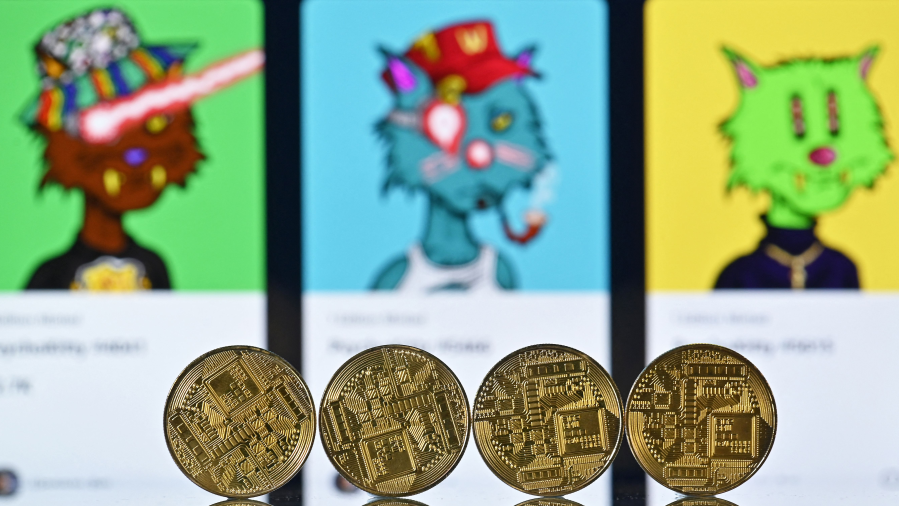As the NFT market grows, so does the potential for scams

NFTs, also known as nonfungible tokens, are a bit of a tech fad at the moment, with plenty of different opinions about whether they are here to stay. But for now, they are continuing their push into the mainstream. NFTs are digital assets, like JPEGs or tweets, that can be bought and sold on a marketplace.
A way to make something that traditionally could just be copied and shared online, rare — and therefore, to some, valuable.
When you purchase one, you get a digital contract that is stored on blockchain, a digital cybercurrency ledger. Meaning that if I theoretically buy an NFT of the “Mona Lisa,” I can point to code that says I own it.
And as transaction prices for these items climb, so does the risk of scams.
Corin Faife is a senior reporter at The Verge who’s been following this trend. He said he’s heard many stories from people who were defrauded on the popular gamer messaging platform Discord. The following is an edited transcript of our conversation.
Corin Faife: With NFT projects, an important part of selling the NFT is to develop a community, to develop a bit of hype around it, and just get people talking about it. So in that sense, Discord has been a very suitable platform for doing that. But it has also led to some problems because it wasn’t originally designed as being a secure communication platform. It wasn’t something where they expected people to be making high-value transactions, so because of that, there are various different security concerns that have come about.

Kimberly Adams: Give us some examples. It seems that there have been a couple of big NFT scams happening on Discord.
Faife: The most common thing that happens is called phishing. So people are just receiving messages which sometimes they think they’re being offered a promotional deal, some kind of sale that will help them buy these NFTs more cheaply than they would on the market. And instead, people are just tricking them into connecting their cryptocurrency wallets to some kind of fraudulent site that’s been set up. Once they’ve authorized these transactions, which can be transferring the money or the NFTs out of their cryptocurrency wallets and to whoever has set up the scam.
Adams: What about scams happening on other platforms outside of Discord?
Faife: Yeah, I mean, unfortunately, there are scams absolutely everywhere. So some scams are happening through Discord, on Twitter, on Reddit. Really any platform where people are communicating about cryptocurrency and NFTs, there’s always going to be some people trying to take advantage.
Adams: Once these assets, these NFTs, are stolen, is there any way for people to get them back?
Faife: Because of the way that blockchain technology works, transactions are pretty much irreversible once they’ve taken place. So there isn’t really any authority that you can appeal to either if some of your bitcoin or ethereum or NFTs get stolen. There isn’t really anyone who can issue you a refund, usually. So a lot of the time, that money is just lost.
Adams: Do you have any sense of how widespread these scams are or how much money they’ve stolen?
Faife: I don’t know how much money has been stolen exactly. The scams are very widespread. I get messaged about these scams faster than I can write about them. And I think that within the NFT space, security is just thought about in a very different way to security in other kind of digital spaces, where — if we’re talking about something like email, say, we looked at institutions like Gmail to help us secure the product. So Google isn’t just gonna wave its hands and say, “OK, there’s a lot of spam email out there, but that’s your responsibility. Just try not to click on it.” Instead, they develop all of these products to help protect users and so on. With cryptocurrency, so much more of the attitude is just that it’s on the end user to verify that whatever they’re doing is correct, and a lot of people particularly who are newer to the space are just unprepared for the burden of security that is put onto the individual.
Adams: What’s the worst scamming story you’ve heard so far?
Faife: Some NFT projects have become very high-valued. One of the most high-valued at the moment is called “Bored Ape Yacht Club.” People who have had those NFTs phished or stolen from them could potentially be losing hundreds of thousands of dollars, even maybe millions of dollars, just with the theft of a single NFT.
Related links: More insight from Kimberly Adams
If you’re looking for a deeper dive into some of the scams Faife talked about, we’ll connect to some of the articles he’s written for The Verge. One is about the Ozzy Osbourne NFT community, where a fraudulent link allowed scammers to collect almost $41,000.
If you’ve been contemplating getting into the NFT space, CoinDesk has a helpful guide to avoiding being swindled.
And on Tuesday, YouTube CEO Susan Wojcicki said in a letter to the YouTube community that the company is likely to jump on the bandwagon as well, saying YouTube plans to help creators “capitalize on emerging technologies, including things like NFTs.”
The future of this podcast starts with you.
Every day, the “Marketplace Tech” team demystifies the digital economy with stories that explore more than just Big Tech. We’re committed to covering topics that matter to you and the world around us, diving deep into how technology intersects with climate change, inequity, and disinformation.
As part of a nonprofit newsroom, we’re counting on listeners like you to keep this public service paywall-free and available to all.
Support “Marketplace Tech” in any amount today and become a partner in our mission.

















